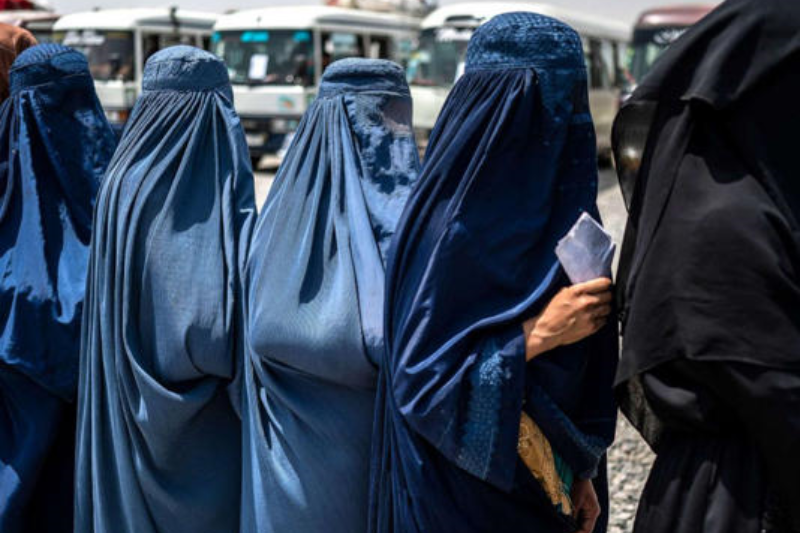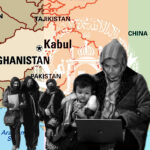
silent suffering the plight of afghan women
The Taliban have taken another great step towards erasing women from public life by closing thousands of beauty salons across Afghanistan. Here are some other restrictions Afghan women face.
According to Taliban decrees, thousands of Afghan beauty salons will be forced to shut down this month. For many women, these salons are their only legal means of earning money. Besides providing a source of income for many families, they also offered a safe place for women to meet, exchange ideas, and feel welcome.
Almost no other country restricts women’s rights as much as Afghanistan, where women live in prison-like conditions and are forbidden from taking part in public life.
Nada Al-Nashif, the UN’s Deputy High Commissioner for Human Rights, said in a statement on June 19 that women’s and girls’ lives have been restricted in every way for the past 22 months.
In a recent report, the UN Human Rights Council stated further that the Taliban “may be responsible for gender apartheid” due to the “grave, systematic and institutionalized discrimination against women and girls.”
Studying is no longer possible for women
Afghan women have been banned from higher education since the Taliban seized power in August 2021. University students were initially strictly separated from men. For some time, female students could only be taught by older men or other women. Afghan Education Ministry officials expelled female students from universities in late 2022.
In 2018, there were some 90,000 women enrolled in higher education, according to the United Nations Educational, Scientific and Cultural Organization (UNESCO).
The Taliban said their ban was fair because many female students did not wear proper Islamic clothing, like a hijab, and because people of different genders were there.
In December 2022, Stephane Dujarric, a spokesperson for the UN, said that it was hard to imagine how Afghanistan would grow and deal with its problems without the active participation of women and the education they bring to the table. He said that women had a “devastating effect on the country’s future.”
Several media reports state that women in Bangladesh now attend online seminars to continue their education. However, due to the country’s poor internet network and the lack of jobs and career prospects, there are more viable options.
The exclusion of women from the job market
According to the International Labor Organization, the number of women employed in mid-2021 was 25% lower than last year.
Women are not allowed to work with the United Nations or nongovernmental organizations under the Taliban. As a result, several international non-governmental organizations, including Save the Children, the Norwegian Refugee Council, and CARE, have closed their operations in Afghanistan, since they are unable to implement their projects without female workers. People who worked for the government were fired or even paid to stay home thousands of times.
Keep Reading
Yamini Mishra, who runs the South Asia office of Amnesty International, says that not letting women work for non-governmental organizations in Afghanistan is making the situation worse. She said that the Taliban are trying to cause a famine in the country.
According to her, their discriminatory policies are causing shocking levels of food insecurity and making it almost impossible for international aid to reach the country. As women are forbidden from being in contact with men who are strangers to them, they can only receive assistance from other women who need help.
Women are also severely restricted when it comes to healthcare
In Afghanistan, women, mothers, and babies face the greatest dangers. Each year, about 70 out of 1,000 women die while pregnant or giving birth. Many mothers lack adequate nutrition, which increases the risk of complications during pregnancy. They find it difficult to feed their children after giving birth.
It has been reported that Doctors Without Borders has drastically worsened access to medical treatment due to the Taliban’s decision to exclude women from higher education and employment at aid organizations. Specifically, the Taliban have restricted women’s travel.
In rural areas, the distance to the closest hospital can often exceed 75 kilometers (47 miles), and women are not permitted to travel alone; they must be chaperoned by a “mahram,” typically their father, husband, or brother. Afghans cannot afford such lengthy trips, much less ones involving two people.
Additionally, the Taliban have decided that women can only be treated by female doctors. Despite this, women have been permitted to continue working in hospitals — but there are far too few female doctors, especially in rural areas. The same movement restrictions apply to them, too. Those who can’t find a mahram to accompany them to work must stay home. This is why there are very few female doctors and midwives in Afghanistan.
No sports, strict dress code
Afghan TV host Sonia Niazi resisted having to cover her face in the summer of 2022 but was compelled to do so on camera.
A woman in Afghanistan is required to wear a burqa, a garment that covers her entire body. Her male relatives will be jailed if she does not comply with this regulation.
As a result of this rule, Afghan women’s national teams live in exile in Australia. According to Taliban edicts, Afghan women are forbidden from going to parks, fitness studios, public pools, gymnasiums, or sports clubs, making sports practically impossible.
Silent Suffering: The Plight of Afghan Women, conclusion-
Afghan women’s plight is a painful tale of oppression, discrimination, and silent suffering. Thousands of courageous women continue to fight for their rights to education, employment, healthcare, and independence despite the Taliban’s numerous restrictions. We cannot lose sight of the fact that a whole population is being denied these basic human rights. The only way Afghanistan will experience significant change is through international pressure. It is our responsibility to bring attention to this situation and make sure Afghan women’s voices are heard all over the world.









